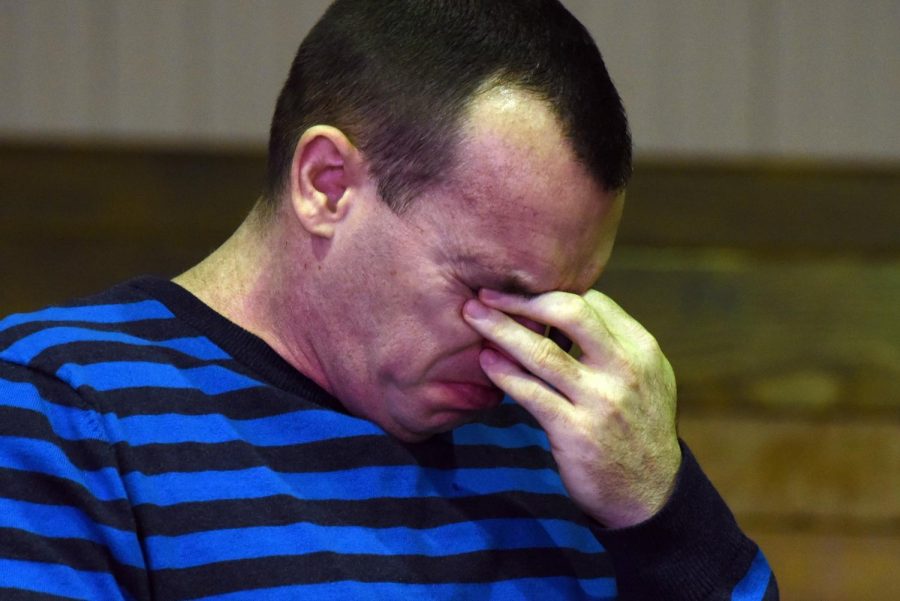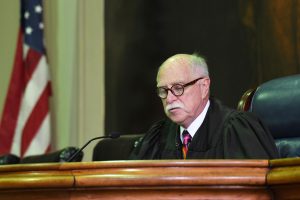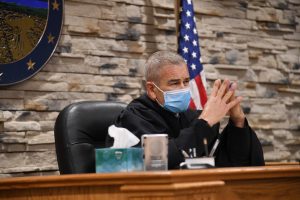Newark man in 1998 case facing life in prison without parole
John J. Iden becomes emotional as his defense attorney, Jeff Blosser, presents his closing statement to the jury.
December 11, 2018
Due to John J. Iden, Jr.’s prior convictions in cases of sexual nature, his rape charge brought on a specification of violent sexual predator. That specification means that, regardless of his sentencing in other charges, he should receive life in prison without the possibility of parole.
“That means that, when he’s sentenced, regardless of what he gets on the other charges, he will get a sentence of life without parole on the rape (charge),” Muskingum County Prosecuting Attorney Ron Welch said. “Because he’s been convicted before of sexual offenses, the specification that’s placed on him indicates that he’s a sexually violent predator.”
During Welch’s opening statement on Tuesday, Dec. 4, he said, “Justice delayed is better than justice denied.”
Welch held to that statement Monday night and said that he believes justice was served.
Iden’s victims lined the benches at the back of the courtroom with high emotions as Clerk of Courts, Todd Bickle, read that the jury found Iden guilty of all six counts he was charged with Monday evening.
“I feel like it was served not just for (the victim) but for all the other victims you heard from in court as well as victims that we weren’t able to present,” Welch said.
There are at least four other victims that the prosecutors representing the State’s case were aware of but could not present during the trial as their sexual assault location profile did not align with the other six women’s.
Background
On the morning of Sept. 26, 1998, a woman was found covered in blood, standing in a field off the side of the road, wearing a T-shirt and one sock.
The woman will be referred to as “the victim.”
The victim didn’t remember what happened to her. To this day, she doesn’t remember what happened to her. She was sexually assaulted, badly injured and left for dead in the middle of Dillon State Park with no one around.
She had six lacerations to the back of her head, four lacerations to her forehead and abrasions on her neck, chest wall, arms, legs and backside.
When the victim arrived at the hospital, a sexual assault kit was performed on her, but, due to DNA results that were not incriminating enough in 1998, the kit sat in evidence at the Muskingum County Sheriff’s Office until 2016.
In 2016, Attorney General Mike Dewine launched a Special Initiative to test, or retest, previous rape kits across the State of Ohio. One of those kits was from Sept. 26, 1998, involving the victim in this case.
“The Sexual Assault Kit Initiative is important because, oftentimes, it’s difficult to proceed on a sexual assault case where the evidence is just that of the victim,” Welch said. “Where you have a victim that says she was sexually assaulted, you have a perpetrator that said he didn’t do it and without DNA it’s difficult for many people to believe just the word of a victim.”
Due to advancements in technology over the past 20 years, it was found that a partial DNA profile found in an intimate area of the victim matched Iden’s DNA, one of the eight Bureau of Criminal Investigation forensic scientists said during her testimony.
Eight of over 30 witnesses on behalf of the State were personnel from BCI who had come into contact with the rape kit or evidence collected in the victim’s case.
Throughout the week of the trial, five of those witnesses were women claiming they were sexually assaulted by Iden prior to Sept. 26, 1998.
All five women gave descriptions of their attacker with an emphasis on the location they were assaulted. They all were in the backseat of Iden’s white Ford Tempo in a secluded area surrounded by woods and fields.
For more background information visit:
- Man stands trial for 1998 alleged rape, attempted murder case
- Five additional, alleged victims testify man in 1998 case sexually assaulted them
Closing statements
Muskingum County Assistant Prosecuting Attorney Gerald Anderson began his closing statement on behalf of the State of Ohio with an analogy when reminding the jurors they could take circumstantial evidence into account and make educated inferences.
Anderson used the analogy of leaving freshly baked cookies in the kitchen and returning to find no cookies left but a nephew with crumbs and icing on his face. It’s with good faith, he said, that a person can infer their nephew ate the cookies.
Anderson asked the jurors to apply that scenario to the case. While no one saw Iden sexually assault, beat or kidnap the victim, he asked them to take all of the evidence into consideration while making their decision. No witnesses saw Iden leave the bar with the victim, but other witnesses saw them at a truck stop after the bars closed.
“He was the last person seen with her before she was found raped, beaten, bloody and left for dead,” Anderson said while addressing the jury.
Anderson went on to refresh the jury’s memory of every witness that had taken the stand to testify. Toward the end he walked the jurors through the places where the six women were sexually assaulted, places that he called the defendant’s “hunting grounds.”
After outlining each of the six counts Iden was charged with, he left the decision up to the jury and asked that they not discount any evidence, witness, technicality, process and story that went into the case.
“The defendant is guilty of all charges,” Anderson said to end his closing statement. “Justice requires that you find the defendant guilty.”
To counteract, Iden’s defense attorney, Jeff Blosser, began his closing statement by reminding the jury that both opening and closing statements from both sides were matters of opinion and not evidence. He followed those statements by saying that every person in the courtroom has rights.
“If we start to water down even one of those rights, it affects the rest of the rights,” Blosser said. “We convict those who are guilty beyond a reasonable doubt.”
Referencing his opening statement, Blosser said his job was not to prove Iden’s innocence in the matter, rather, it was the State’s task to prove his guilt.
“Probably guilty doesn’t count,” Blosser said.
He asked that the jurors be confident in their decision making as he pointed out seemingly flawed aspects of the case, including a nickname that the victim used for Iden which was Mark instead of his actual name of John. He added no one actually witnessed any crime happen between Iden and the victim that night. While he recognized that the victim suffered a tragedy, no one could say with certainty that Iden was the inflictor of that tragedy.
“She was horribly injured, we’re not going to dispute that,” Blosser said before qualifying that Iden is innocent and will remain innocent until the jury rules otherwise.
To conclude his statements, Blosser brought his closing full circle by taken one last opportunity to remind the jury that each person in the courtroom has rights, but they had the power to violate those rights.
“People fought and died for those rights. We all have them, not just Mr. Iden,” Blosser said.
The State had a chance for rebuttal after Blosser concluded his closing statement. Welch approached the jury and compared the victim’s attempt at recalling what happened to her to putting the pieces of a shattered light bulb back together.
A task that he alluded was nearly impossible “when you had your brain smashed … your skull caved in,” Welch said.
He continued by disputing Blosser’s claim that the jury was in a tough spot by reassuring them they had the tools to make the correct decision, they had the evidence and the proof they needed.
“He knew these areas, he knew his victims. He had an MO, he had a pattern,” Welch said.
MO is a term that stands for modus operandi, which is defined as a particular way or method of doing something, especially one that is characteristic or well established.
After the conclusion of the case, Welch said he was pleased with the State’s victory not only for satisfaction with his preparations and efforts, but mainly for the victims he was fighting for.
“It means a great deal, but it means a great deal more to the victims,” Welch said. “They’ve lived with the horrors of this case for 20 or more years and many of those years were spent knowing that he was an evil, sexual predator that was out free, and now they can go to bed tonight knowing that he’s never going to see the outside of a prison hall again.”
Iden is currently being held in the Muskingum County Jail until his sentencing.
For more information on the case and trial:













SHARON BOLES • Dec 11, 2018 at 6:35 pm
WOW!
I had no idea this was going on. Thank you for a well written story.